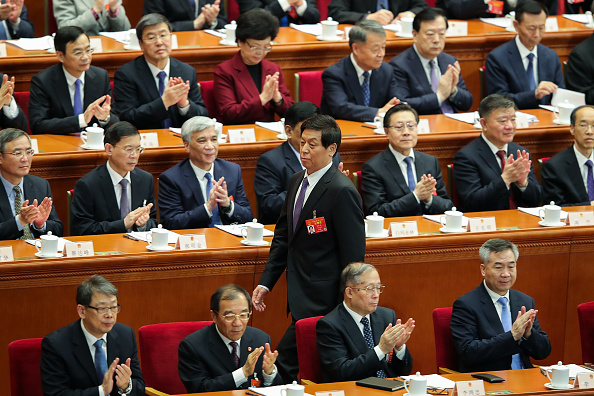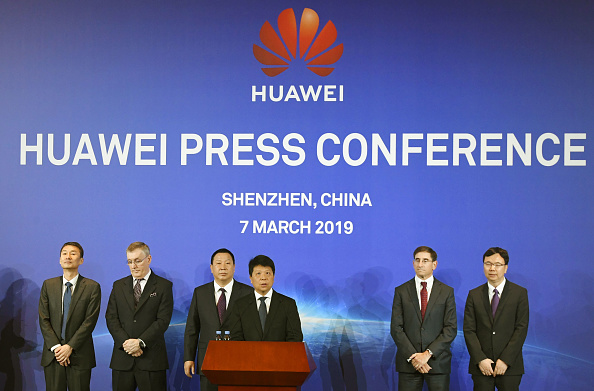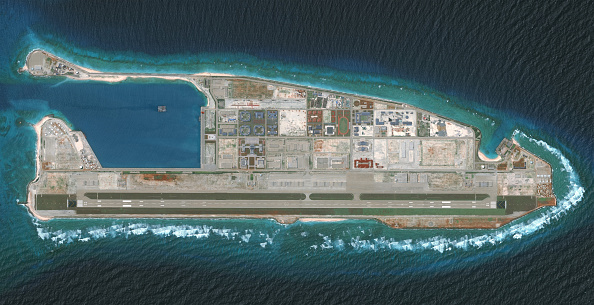
 Reading the Tea Leaves
Reading the Tea LeavesThe annual gathering of China's legislature, the National People's Congress (NPC), kicked off this week in Beijing, with the U.S.-China trade dispute and the international legal case against Huawei taking center stage. While mostly ceremonial in nature, the annual parliamentary-style meeting of nearly 3,000 representatives is a prime opportunity for China hands to read the tea leaves and gather data on economic and security matters.
In advance of the meeting, China announced a 2019 defense budget growth target of 7.5%. Most analysts had predicted a 8.1% increase, however the effect of the trade war with the United States has impacted China's economy across the board. The target still keeps China on a trajectory to develop one of the world's most advanced militaries.
On the economic front, a National Development & Reform Commission report released on Tuesday during the NPC meeting reveals that Beijing has lowered economic growth targets to 6-6.5%, and will implement a major tax cut of 2 trillion yuan. This would be the lowest target for economic growth in three decades, showing that China is prioritizing a restructure of its economy, the alleviation of poverty, and the cleanup of its environment. Last night, responding to U.S. complaints over its lack of financial liberalization, China formally introduced the latest draft of the foreign investment law, which is supposed to create a fairer business environment for foreign firms registered in China. Additionally, Beijing has announced that it will create a new national oil and pipeline company as part of a major energy industry overhaul.
Notably absent in Premier Li Keqiang's address to the legislature, however, was any reference to "Made in China 2025," a program designed to make China a technology leader but heavily criticized by the Trump administration for its large subsidies to domestic companies. Beijing's drop of Made in China 2025 seems to be an attempt to assuage the Trump administration's complaints, but some analysts aren't convinced and say that the program is still being promoted, just without the name.
As the trade war nears its likely end, Premier Li warned the 3,000 delegates of "greater expected and unexpected risks and challenges" to come and a "hard struggle" ahead.
 Huawei's Revenge
Huawei's RevengeHuawei is not backing down from a fight. Huawei's CFO Meng Wanzhou filed a civil lawsuit this weekagainst the Canadian government, alleging that their client was detained, searched, and interrogated in violation of her constitutional rights. Arrested in December in British Columbia, Meng is facing possible extradition to the United States over bank and wire fraud in violation of American sanctions against Iran. In addition, lawyers for Meng have also cited U.S. President Donald Trump's comment that he would possibly intervene in the case if it's helpful for his trade deal with China, saying that the arrest could have been politically motivated.
As what is largely perceived a counter move, China has now accused two Canadian citizens of espionage. Announced two days before Meng's extradition hearing is set to begin, these accusations will certainly deepen the worsening relations between Canada and China. One of the Canadians stands accused of "stealing and spying to obtain state secrets," whereas the other is named as a source.
At the same time, Huawei executives are taking matters into their own hands with another lawsuit, this time against the U.S. government. Huawei alleges that Congress violated its own Constitution by ordering government agencies not to purchase Huawei equipment. The telecoms giant alleges that Congress illegally deprived Huawei of due process, "stigmatizing it by effectively branding it a tool of the Chinese government and a risk to U.S. security."
Huawei is also taking its case global, opening a cybersecurity laboratory in Brussels in order for government agencies, technical experts, industry associations, and standards organizations to collaborate. Huawei executives are working hard to persuade government leaders that the company does not pose a cybersecurity risk, despite heavy lobbying from Washington, as the U.S. has lobbied its allies not to do business with Huawei.
 New Solutions for Old Treaties
New Solutions for Old TreatiesThe Trump administration is now turning its attention away from the failed summit with North Korea and towards another Asian nation, the Philippines. Secretary of State Mike Pompeo recently visited Manila with the hopes of seeking assurances over the Philippines Mutual Defense Treaty.
The Philippines top defense official is calling for a review of the 68-year old treaty, in order to avoid any armed conflict with China in the South China Sea.
Philippine defense secretary Delfin Lorenzana suggested that the Philippines is increasingly concerned over conflict in the region and that the treaty is vague enough to cause chaos and crisis. In the event that there is a conflict between Philippines and a third party, any intervention from the U.S. would require Congressional approval, which would leave the Philippines vulnerable.
The comments were made a day after America flew a B-52 bomber over contested islands in the area, amidst increasing patrols and passages of naval vessels.
As the Philippines debates this treaty, it is likely to reveal divergent factions in Manila who have been debating the future of the country's relationship with both the United States and China.
Prepared by China-US Focus editorial teams in Hong Kong and New York, this weekly newsletter offers you snap shots of latest trends and developments emerging from China every week, while adding a dose of historical perspective.
- 2019-03-01 The Art of No Deal
- 2019-02-23 The Devil is in the Details
- 2019-02-16 Trade Talks, Round 3: Waiting for Trump-Xi?
- 2019-02-08 Welcoming the Pig
- 2019-02-02 The Final Countdown: One Month Until Trade Talks Deadline
- 2019-01-26 How Slow Will it Go?
- 2019-01-18 Countdown to Trump-Kim: Round Two
- 2019-01-11 Kim Jong-un Visits Beijing
- 2019-01-04 Cross-strait tensions mount on anniversary
- 2018-12-21 Xi’s 40th Anniversary Speech
- 2018-12-14 Post-G20 Detentions & Tech Tensions
- 2018-11-30 Trump and Xi Set to Face Off at the G20
- 2018-11-26 Xi Strengthens Alliances in Preparation of G20
- 2018-11-16 World Leaders Meet at ASEAN and APEC Summits to Discuss Economic Strategy
- 2018-11-09 US and China Hold Delayed Diplomatic and Security Dialogue
- 2018-11-02 Presidents Xi and Trump Talk Possible Trade Deal
- 2018-10-26 With U.S. Pressure, China and Japan Grow Closer
- 2018-10-19 Secretary Mattis Meets Chinese Counterpart in Singapore
- 2018-10-12 Trump and Xi May Meet at the G20
